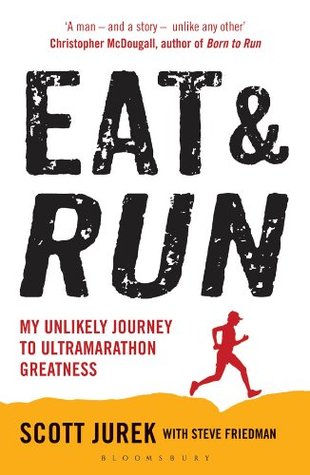More on this book
Community
Kindle Notes & Highlights
by
Scott Jurek
Read between
February 2 - June 20, 2019
an ultrarunner’s mind is what matters more than anything.
Racing ultras requires absolute confidence tempered with intense humility. To be a champion, you have to believe that you can destroy your competition. But you also have to realize that winning requires total commitment, and a wavering of focus, a lack of drive, a single misstep, might lead to defeat or worse.
“Not all pain is significant.”
Ultrarunners can—much of the time—bring support crews, men and women who provide food, water, updates on competitors, and reassurance that you can, in fact, continue when you are sure you will collapse.
Running efficiently demands good technique, and running efficiently for 100 miles demands great technique. But the wonderful paradox of running is that getting started requires no technique.
Don’t worry about speed at first or even distance. In fact, go slow. That means 50 to 70 percent of your maximum effort. The best way to find that zone is to run with a friend and talk while you’re doing so. If you can’t talk, you’re running too fast and too hard. Do a combo of running and walking if needed. Don’t be afraid to walk the uphills. Over time, add distance. Your long, slow runs will strengthen your heart and lungs, improve your circulation, and increase the metabolic efficiency of your muscles.
You never know how strong you are until being strong is the only choice you have.
I would learn that a plant-based diet meant more fiber, which sped food through the digestive tract, minimizing the impact of toxins. The same diet also meant more vitamins and minerals; more substances like lycopene, lutein, and beta carotene, which helps protect against chronic disease. And it would mean less refined carbohydrates and trans fats, both implicated in heart disease and other ailments.
Wanting to be someone else is a waste of the person you are.
count the times your right foot strikes the ground in 20 seconds. Multiply by three and you’ll have your stride rate per minute. (One stride equals two steps, so your steps per minute will be twice your stride rate.)
“When you run on the earth and with the earth, you can run forever.”
Bushido is letting go of the past and the future and focusing on the moment.
After you’ve been running for 30 to 45 minutes at least three times a week for six to eight weeks, you’re ready to start running occasionally at 85 to 90 percent of your physical capacity, or the point where lactate is building up in your muscles but your body is still able to clear and process it. Build to where you can maintain that lactate threshold level for 5 minutes. Then take 1 minute of easy running to give the body time to recover, then repeat. As you progress, increase the number of the intervals and their length while maintaining a 5:1 ratio between work and rest. So you would do
...more
Running Wild: An Extraordinary Adventure of the Human Spirit, by John Annerino; Running and Being: The Total Experience, by George Sheehan; and The Marathon Monks of Mount Hiei, by John Stevens.
My blood pressure and triglyceride levels dropped to all-time lows; my HDL, “good” cholesterol, shot up to an all-time high. I had virtually no joint inflammation, even after miles of pounding trails and roads, and on the rare occasions I sprained an ankle or fell and whacked my elbow or knee, the soreness left faster than it ever had before.


